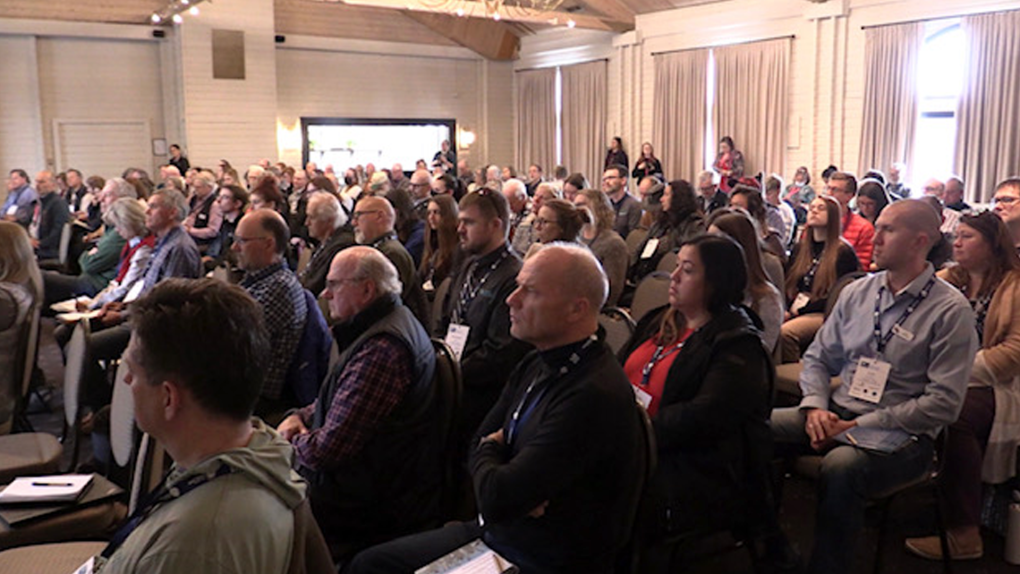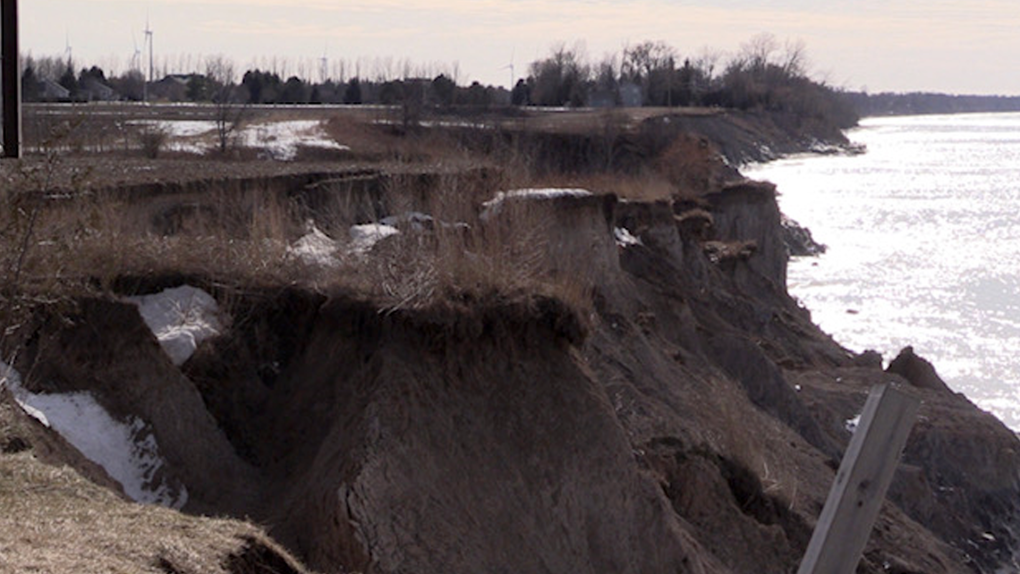Experts say it’s time to ‘retreat’ from eroding shoreline
There are dozens of stairs leading nowhere along the Lake Huron shoreline. Erosion cutting the ground out of from underneath them. Stairs are just the beginning of the problems, according to a coastal expert who said it’s time shoreline property owners practice the 4 R’s.
“The three everyone knows, reduce, reuse, recycle, and the 4th one, is retreat,” said Dr. Mary-Louise Byrne, a Wilfrid Laurier professor and geoscientist who has been studying the Great Lakes shoreline for more than 30 years.
Dr. Byrne, speaking at “Is the Coast Clear,” the first Lake Huron Coastal Centre conference in five years, said the hardening of the shoreline with stone and steel, property by property, simply isn’t working, nor should it.
“You’ll end up creating an environment that is far from the beach environment as it can be, so that you can stay at the beach. It doesn’t make any sense,” she said.
Dr. Byrne isn’t alone in her coastal findings.
Pete Zuzek is a geoscientist specializing in coastal geomorphology. He said “coastal retreat” is the only way to stop homes atop the bluff from eventually falling into Lake Huron.
“There is a growing amount of evidence that it’s actually cheaper to try and move these cottages and homes further back from the lake, than to try and stop the erosion,” said Zuzek.
 A crowd attended the Coast Clear conference organized by the Lake Huron Coastal Centre on May 5, 2023. (Scott Miller/CTV News London)
A crowd attended the Coast Clear conference organized by the Lake Huron Coastal Centre on May 5, 2023. (Scott Miller/CTV News London)
Try telling that to shoreline property owners, said local politicians and conservation authorities who floated the idea of “coastal retreat” along parts of Lake Huron several years ago, and were ridiculed and vilified for it.
“We’ve got some places where there’s four rows of cottages, and they don’t want to give up the front row for four rows back. So, it needs to be a real community conversation. Not an easy answer,” said Municipality of Central Huron Mayor Jim Ginn.
However, it’s a conversation that should be accelerated, said Zuzek. Research suggests overall higher lake levels by mid century, and peak levels exceeding 2019-2020s record setting levels by at least a foot.
 Shoreline erosion near Grand Bend, Ont. as seen in February 2020. (Scott Miller/CTV News London)
Shoreline erosion near Grand Bend, Ont. as seen in February 2020. (Scott Miller/CTV News London)
“We have to be planning for the levels to be even higher than they were just recently,” he said.
“The best way to adapt is to think as an entire community, what is the best thing for the lake. Then to make the hard decisions, and to retreat from the shoreline,” said Dr. Byrne.
CTVNews.ca Top Stories

Trump chooses anti-vaccine activist Robert F. Kennedy Jr. as health secretary
U.S. President-elect Donald Trump says he will nominate anti-vaccine activist Robert F. Kennedy Jr. to lead the Department of Health and Human Services, putting him in charge of a massive agency that oversees everything from drug, vaccine and food safety to medical research and the social safety net programs Medicare and Medicaid.
LIVE UPDATES Rogers Centre opens its doors to thousands of Taylor Swift fans for the first sold-out show
Taylor Swift is in Toronto to perform her first of six sold-out shows at the Rogers Centre tonight.
Purolator workers won't handle Canada Post packages if strike occurs, union says
Teamsters Canada says if Canada Post workers go on strike or are locked out, its members at Purolator won't handle any packages postmarked or identified as originating from the carrier.
Canada urged to cut government-funded research collaborations with China: report
A newly released report is urging Canada to immediately end all government-funded research collaborations with China in a variety of different areas.
Measles cases in New Brunswick continues to climb
The number of measles cases in New Brunswick continues to climb. Officials with New Brunswick’s Department of Health said as of Thursday, the number of confirmed cases since October has reached 43.
Police release bodycam video of officer-involved incident at Hindu temple protest in Brampton, Ont.
Police say an officer who forcefully removed a 'weapon' from a protester outside of a Hindu temple in Brampton was acting 'within the lawful execution of his duties' after bystander video of the incident circulated widely online.
Here's how a potential Canada Post strike may affect Canadians
A disruption in Canada Post services would hit some Canadians harder than others. As the deadline approaches for a potential strike at midnight Friday, CTVNews.ca asked readers how it would affect them and how they are preparing.
Police foil attempted $13,000 cheese theft in North Vancouver
Police in North Vancouver say they prevented the theft of nearly $13,000 worth of cheese from a grocery store earlier this year. Now, they're asking the public for help finding the alleged thief.
Partial confinement lifted in Longueuil after CN train derailment and chemical spill
The City of Longueuil has partially lifted the confinement measure currently in effect around the site of a CN train derailment near Jacques-Cartier West Boulevard and Saint-Georges Street after the incident spilt an unknown quantity of hydrogen peroxide Thursday morning.


































